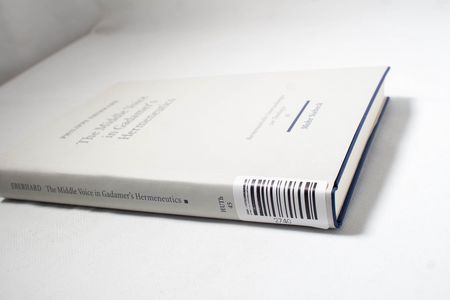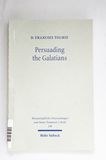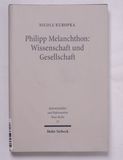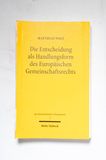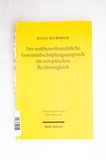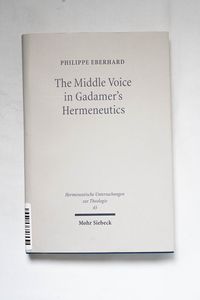
The middle voice in Gadamers hermeneutics : a basic interpretation with some theological implications / Philippe Eberhard
Netto: 27.60 €29,53€
inkl. MwSt. zzgl. Versand
Bearbeitungszeit: 3 Werktage
Sofort lieferbar (auf Lager)
1x Stück verfügbar
Buchzusammenfassung:
Philippe Eberhard proposes a medial interpretation of Hans-Georg Gadamers philosophical hermeneutics and draws theological implications concerning faith and our human condition from a Christian humanist standpoint. He brings into focus the middle voice as a way to articulate what it means to listen to language and the Word. His thesis is twofold. First, the hermeneutic event is medial throughout. The core of the mediality of hermeneutics is the subtle balance between the event of understanding, which happens to the subject, and the subject who understands within it. Second, the mediality of understanding is the primary reason why hermeneutics is theologically meaningful. Both understanding as well as faith and theology are medial experiences leading to an always renewed understanding of what it is to be a human being in the world. The author analyzes the notion of the middle voice from a linguistic as well as from a philosophical standpoint and establishes that the middle voice is conspicuous by its absence in most commentaries about Gadamer: usually mediality shines between the lines but does not receive any explicit treatment. The author describes understanding as an event following Gadamers notions of play, fusion of horizon(s), and linguistic speculation and considers the same event from the standpoint of the subject within it. Though understanding is an event that happens to the subject, the subject is not passive but involved. The examination of Gadamers use of theology leads to the argument that he tends to exclude the Christian kerygma from the hermeneutic event. Gadamer does not apply back to theology the insights he gained from it for his description of hermeneutics. Philippe Eberhard, by contrast, includes the kerygma and faith in hermeneutics and proposes a medial account of faith based on the medial interpretation of hermeneutics. Finally, the conclusion sums up the argument and goes one step further: although faith is a hermeneutic experience, it differs from hermeneutics because it is not only a constant effort to be at home in the world, but above all it keeps questioning the world that is to be our home.
FAQ zum Buch
Die mittlere Stimme ist eine grammatische Kategorie, die in bestimmten Sprachen eine zwischengewichtete Perspektive zwischen Aktiv und Passiv ermöglicht. Sie wird aus syntaktischer, morphologischer und pragmatischer Sicht analysiert. Diskussionen bestehen über ihre universelle Existenz und ihre semantische Ausprägung in unterschiedlichen Sprachsystemen. Dieses FAQ wurde mit KI erstellt, basierend auf der Quelle: S. 8, ISBN 9783161481574
Die Spekulation der Sprache in Gadamers Hermeneutik bezeichnet die grundlegende Rolle der Sprache als prejudizielle Struktur, die das Verstehen prägt. Sprache ist Teil der “Dimension von Sinnhaftem“, in der Vergangenheit und Gegenwart sich vermitteln. Der Verstand ist nicht subjektiv aktiv, sondern eingeschlossen in ein Überlieferungsgeschehen, das durch Sprache bestimmt wird. Die Sprache ist nicht nur Mittel, sondern das Wesen des Verstehens, das sich in einer medialen, nicht aktiven Beziehung zur Tradition vollzieht. Dieses FAQ wurde mit KI erstellt, basierend auf der Quelle: S. 95, ISBN 9783161481574


